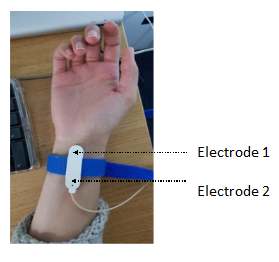
About Us
ADD/ADHD News
ADD/ADHD Books
ADDerwards
Creative ADDers
Donate
Events
GO Games
Information
Links
Natural Remedies
Research
Resources
Support Groups
Whats New
ADHD SOFTWARE
FREE DVD or CD

ADD/ADHD Online Information
THIS STUDY IS NOW CLOSED
Research into MNS effects on ADHD, OCD and GAD
Ethics Approval Number: F1269
Researchers: Mairi Houlgreave, Isabel Farr, Erika Badinger
Supervisor: Prof. Stephen Jackson
Researchers at the University of Nottingham are looking for participants with ADHD symptoms to take part in a study investigating the effects of median nerve stimulation (MNS) at the wrist on ADHD symptoms. The research team have previously shown the effectiveness of this technique in reducing the urge to tic in Tourette syndrome.
Why is this research being carried out?
We have recently shown that electrical stimulation of the median nerve can reduce symptoms in Tourette Syndrome (TS). About 90% of individuals with TS present other conditions including attention deficit hyperactivity disorder (ADHD), obsessive-compulsive disorder (OCD) and generalised anxiety disorder (GAD) as these conditions involve the same brain regions.Because of this, we now want to examine the effects of median nerve stimulation on ADHD, OCD and anxiety symptoms. To do this, we are looking for people aged 12 years and older with ADHD, OCD or anxiety symptoms to take part in our study.
What is median nerve stimulation?
Median nerve stimulation is a non-invasive brain stimulation technique that targets a peripheral nerve. Peripheral nerves are able to send signals to the brain, so by stimulating them it is possible to safely and indirectly influence brain activity. This study involves using electrical stimulation applied to the nerve through small electrodes placed over the wrist.
This picture shows the position of the two electrodes used to deliver the stimulation.
What will happen if I decide to take part in the study?
First, we will have to find the stimulation intensity which produces a twitch in your thumb. Then, you will proceed to do the task. The task consists of rating your conditionís symptoms using a slider that will be placed in front of you for 36 minutes. During the experiment you will receive different types of stimulation which will be either rhythmic or arrhythmic (random). For three 4-minute blocks of the experiment, you will receive no stimulation, but you will be asked to continue rating your conditionís symptoms during these blocks.We will stimulate at safety parameters so that there are no risks. Wrist stimulation is not painful, but if you find the procedure uncomfortable we will terminate the study immediately. We will do some tests before the study so that you can see how the stimulation feels like and if you still want to proceed with the study or not.
Before, during and/or after the study, we will ask you to complete some questionnaires and have some short discussions about your general well-being. These questionnaires include assessment of obsessive-compulsive disorder (OCD), attention deficit hyperactivity disorder (ADHD), anxiety, and autism spectrum conditions. We will also record all you current and past medication. Please note that the questionnaire measures used are not a diagnosis and we will not be able to comment on these further. If the questionnaires highlight any concerns, please contact a health professional such as your GP to discuss them. Any answers you give will be kept confidential and we will only use the information for the purposes of this research project.
Expenses and payments
We will be able to assist you with a small travel allowance if you are coming from outside Nottinghamshire.Note: The technology used in this study is in the development phase and not currently available outside of the study.
Participation in this study is totally voluntary and you are under no obligation to take part. You are free to withdraw at any point before or during the study. All data collected will be kept confidential and used for research purposes only. It will be stored in compliance with the General Data Protection Regulation and Data Protection Act (2018). The researchers involved in this study are employed through the University of Nottingham and will process your personal data in order to carry out this research. The legal basis for this processing is Article 6(1e) - processing is necessary for the performance of a task carried out in the public interest.
THIS STUDY IS NOW CLOSED
[Back To Research Menu]
Home About Us ADD/ADHD News ADDerwards Advertising Books Contact Us Creative ADDers Donate
Events Forums Information Links Natural Remedies ADDers.org News Research Resources Search adders.org
Site Map Social Stories Sponsor Events Student/Researchers Support Groups Supporters

ADHD SOFTWARE
FREE DVD or CD

